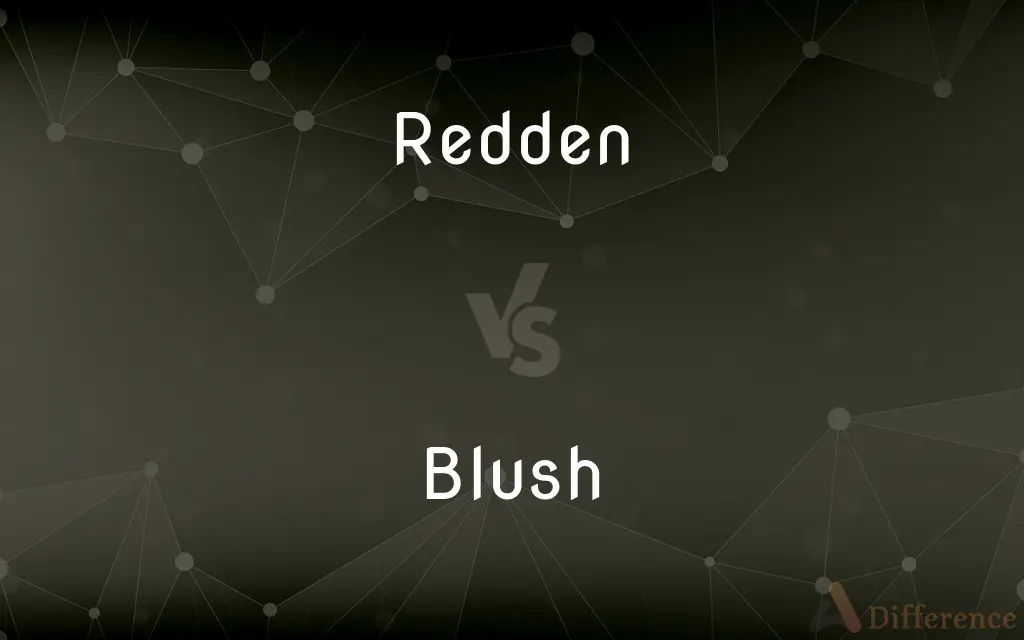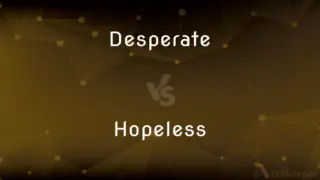Redden vs. Blush — What's the Difference?
By Maham Liaqat & Urooj Arif — Updated on April 22, 2024
Redden refers to anything turning red, while blush is specifically about a person's face reddening due to emotions.

Difference Between Redden and Blush
Table of Contents
ADVERTISEMENT
Key Differences
Redden is a general term that can be used to describe any object, surface, or skin area turning red, due to various factors like heat, pressure, or chemical reactions. On the other hand, blush specifically refers to the reddening of a person's face caused by emotional responses such as embarrassment, shyness, or excitement.
When discussing physiological responses, to redden can occur anywhere on the body or on objects not capable of emotion, such as a piece of metal heated until it glows red. Blush, however, is always related to human emotion and is typically confined to the face, indicating a psychological reaction.
Reddening can be a response to external physical conditions without any emotional connotation. For example, someone's skin might redden from a slap or sunburn. Conversely, blushing is inherently tied to emotional states and is often involuntary, signaling feelings without words.
The triggers for reddening and blushing also differ; reddening can be caused by environmental factors or physical actions, while blushing is triggered by psychological factors. This makes blushing uniquely human and a non-verbal cue of internal emotional states.
While reddening can suggest a variety of conditions, both benign and serious, blushing is usually seen in a social or personal context, often perceived as a sign of humility or vulnerability.
ADVERTISEMENT
Comparison Chart
Definition
Turn red, in general
Face turns red due to emotions
Context
Any object or body part
Specifically human faces
Associated with
Physical or environmental factors
Emotional responses
Physiological basis
Can be from impact, heat, or irritation
Triggered by emotional changes
Social connotation
Varied, can indicate damage or change
Often associated with embarrassment or shyness
Compare with Definitions
Redden
To turn red or cause to turn red.
The apples reddened as they ripened.
Blush
To turn red in the face from modesty, embarrassment, or shame.
She began to blush when her crush complimented her.
Redden
To glow red due to heat.
The metal reddened in the forge.
Blush
To exhibit redness associated with youthful health or emotion.
The children's cheeks were blushed with excitement.
Redden
To cause to turn red in the face or body.
The cold wind reddened her cheeks.
Blush
To show a red color in the face indicating emotional change.
He blushed with pride at his achievements.
Redden
To change color towards red.
The leaves reddened as autumn progressed.
Blush
To feel embarrassment or shame that causes facial reddening.
He blushed at the mention of his earlier mistake.
Redden
To become flushed, particularly due to external effects.
His skin reddened after hours in the sun.
Blush
To become red in the face involuntarily.
She blushed during the awkward silence.
Redden
To make red.
Blush
Show shyness, embarrassment, or shame by becoming red in the face
Kate felt herself blushing scarlet
She blushed at the unexpected compliment
Redden
To become red.
Blush
Be or become pink or pale red
The trees are loaded with blushing blossoms
Redden
To blush.
Blush
A reddening of the face as a sign of shyness, embarrassment, or shame
He had brought a faint blush to her cheeks
Redden
(intransitive) To become red or redder.
Blush
A pink or pale red tinge
The roses were white with a lovely pink blush
Redden
(transitive) To make red or redder.
Blush
A wine with a slight pink tint made in the manner of white wine but from red grape varieties
Blush Zinfandel
Redden
To make red or somewhat red; to give a red color to.
Blush
Another term for blusher (sense 1)
Redden
To grow or become red; to blush.
Appius reddens at each word you speak.
He no sooner saw that her eye glistened and her cheek reddened than his obstinacy was at once subbued.
Blush
To become red in the face, especially from modesty, embarrassment, or shame; flush.
Redden
Turn red, as if in embarrassment or shame;
The girl blushed when a young man whistled as she walked by
Blush
To become red or rosy.
Redden
Make red;
The setting sun reddened the sky
Blush
To feel embarrassed or ashamed
Blushed at his own audacity.
Redden
Turn red or redder;
The sky reddened
Blush
A reddening of the face, especially from modesty, embarrassment, or shame.
Blush
A red or rosy color
The blush of dawn.
Blush
A glance, look, or view
Thought the painting genuine at first blush.
Blush
Makeup used on the face and especially on the cheekbones to give a usually rosy tint. Also called blusher.
Blush
An act of blushing; a red glow on the face caused by shame, modesty, etc.
Blush
A glow; a flush of colour, especially pink or red.
Blush
(figuratively) Feeling or appearance of optimism.
Blush
A sort of makeup, frequently a powder, used to redden the cheeks.
Blush
A color between pink and cream.
Blush
A pale pink wine made by removing the dark grape skins at the required point during fermentation.
Blush
The collective noun for a group of boys.
A blush of boys.
Blush
(intransitive) To become red in the face (and sometimes experience an associated feeling of warmth), especially due to shyness, shame, excitement, or embarrassment.
The love scene made him blush to the roots of his hair / to the tips of his ears.
He wasn't used to this much attention, so he blushed as he saw dozens of pairs of eyes watching him.
Blush
To be ashamed or embarrassed (to do something).
Blush
(intransitive) To become red.
Blush
(transitive) To suffuse with a blush; to redden; to make rosy.
Blush
(copulative) To change skin color in the face (to a particular shade).
When he saw it, he blushed a beet red.
I wasn't surprised, but it was embarrassing enough that I blushed a little pink.
Blush
(transitive) To express or make known by blushing.
Looking at me with a knowing glare, she blushed her discomfort with the situation.
Blush
(intransitive) To have a warm and delicate colour, like some roses and other flowers.
The garden was full of blossoms that blushed in myriad shades to form a beautiful carpet of color.
Blush
To glance with the eye, cast a glance.
Blush
Of dope or varnish: to develop an undesirable white precipitate on the surface, due to being applied in humid conditions.
Blush
To become suffused with red in the cheeks, as from a sense of shame, modesty, or confusion; to become red from such cause, as the cheeks or face.
To the nuptial bowerI led her blushing like the morn.
In the presence of the shameless and unblushing, the young offender is ashamed to blush.
He would strokeThe head of modest and ingenuous worth,That blushed at its own praise.
Blush
To grow red; to have a red or rosy color.
The sun of heaven, methought, was loth to set,But stayed, and made the western welkin blush.
Blush
To have a warm and delicate color, as some roses and other flowers.
Full many a flower is born to blush unseen.
Blush
To suffuse with a blush; to redden; to make roseate.
To blush and beautify the cheek again.
Blush
To express or make known by blushing.
I'll blush you thanks.
Blush
A suffusion of the cheeks or face with red, as from a sense of shame, confusion, or modesty.
The rosy blush of love.
Blush
A red or reddish color; a rosy tint.
Light's last blushes tinged the distant hills.
Blush
A rosy color (especially in the cheeks) taken as a sign of good health
Blush
Sudden reddening of the face (as from embarrassment or guilt or shame or modesty)
Blush
Turn red, as if in embarrassment or shame;
The girl blushed when a young man whistled as she walked by
Blush
Become rosy or reddish;
Her cheeks blushed in the cold winter air
Common Curiosities
Can animals blush?
No, blushing is a uniquely human trait related to emotional responses and is not observed in animals.
Is it possible to redden without blushing?
Yes, reddening can occur in any context where something turns red, such as due to heat, pressure, or irritation, not necessarily linked to emotions.
What causes someone to blush?
Blushing is caused by an emotional response such as embarrassment, shyness, or excitement, leading to the dilation of blood vessels in the face.
Can blushing be controlled?
Blushing is generally involuntary, but some people can manage their blushing response with relaxation techniques, mindfulness, or in severe cases, medical intervention.
How does blushing differ from flushing?
Blushing is specifically triggered by emotional factors and usually limited to the face, whereas flushing can be caused by physical exertion, heat, or medical conditions and may affect more extensive body areas.
What are the social implications of blushing?
In social contexts, blushing can be perceived as a sign of honesty, vulnerability, or genuine emotional expression, which can affect interpersonal interactions.
Why do some people blush more easily than others?
Genetic factors, personality traits, and social anxiety levels can influence how easily and often a person blushes.
How can one reduce the tendency to blush?
Techniques like cognitive behavioral therapy, mindfulness, and sometimes medications can help manage excessive blushing.
Does everyone blush the same way?
The visibility and intensity of blushing can vary significantly among individuals, influenced by factors like skin color and emotional sensitivity.
Can reddening be a warning sign?
Yes, reddening can indicate irritation, allergy, inflammation, or other health issues, depending on the context and duration.
Share Your Discovery

Previous Comparison
Desperate vs. Hopeless
Next Comparison
Exhibitor vs. VendorAuthor Spotlight
Written by
Maham LiaqatCo-written by
Urooj ArifUrooj is a skilled content writer at Ask Difference, known for her exceptional ability to simplify complex topics into engaging and informative content. With a passion for research and a flair for clear, concise writing, she consistently delivers articles that resonate with our diverse audience.
















































